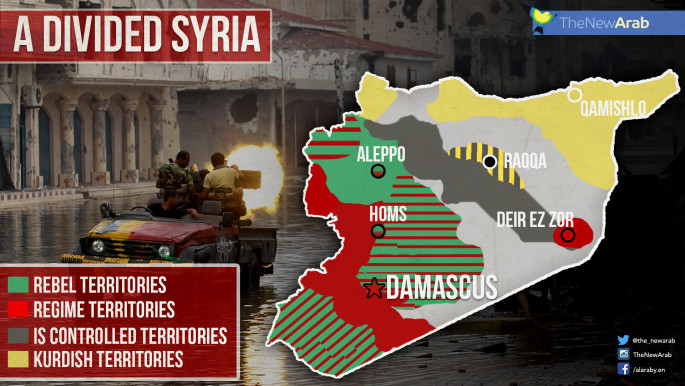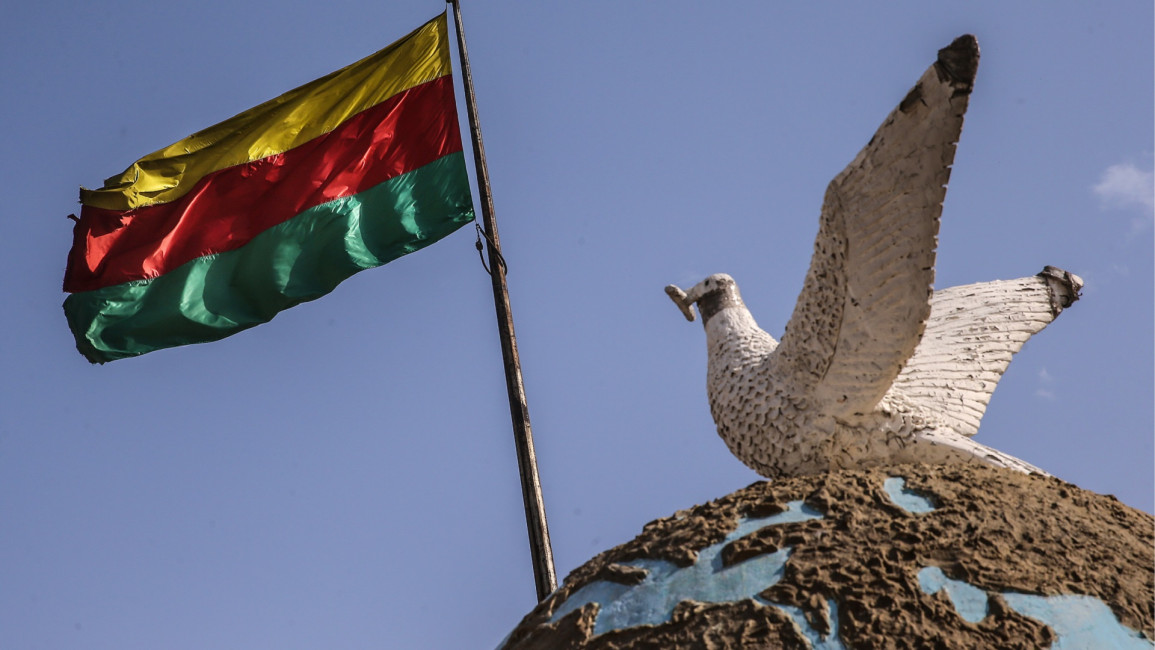Kurds declare autonomous 'federal region' in Syria
The de-facto autonomous Kurdish cantons of Jazira, Kobane and Afrin - together known as Rojava - will now be combined into a single federal region.
The vote to approve a federal system in the three Kurdish-led autonomous areas was held at a conference in the town of Rmeilan in northeast Syria.
The move by Syrian Kurds was "illegitimate and unacceptable", said Syrian opposition leader George Sabra, of the High Negotiations Committee.
The vote was postponed from Wednesday over differences on the draft announcement, according to Kurdish sources who spoke to The New Arab.
The sources said the key contentious issue was over the term "federal government" in the draft, which some Kurdish factions opposed for its possible allusion to total secession from Syria in the future. Such a secession is deemed undesirable by many Kurds here, though others are thought to be keen on a push for full independence and statehood.
This announcement comes after Syria's regime in Damascus ruled out the idea of a federal model for the country - after Assad ally Russia said federalism could be a possible future for Syria.
 |
The Syrian National Coalition said it rejected such unilateral declarations and warned of any attempt to form autonomous regions that 'confiscate the will of the Syrian people'. |  |
'Worthless unilateral moves'
The Syrian government and its opponents alike have rejected the declaration by Kurds in northern Syria.
A statement issued by the Syrian Foreign Ministry said the declaration made in the town of Rmeilan in Syria's Hassakeh province on Thursday was unconstitutional and "worthless".
It warned against any attempt to encroach upon the integrity of Syrian territories.
The Syrian National Coalition, one of the main Syrian opposition groups, also said it rejected such unilateral declarations and warned of any attempt to form autonomous regions that "confiscate the will of the Syrian people".
A Turkish foreign ministry official had said his country rejected any moves that would compromise Syria's national unity - and considers the territorial integrity of Syria as "essential". Ankara fears that a strong autonomous Kurdish area in Syria, allied with the autonomous Kurdish region in Iraq, would provide a stronghold of support for Kurds in Turkey who seek greater autonomy.
"Unilateral moves carry no validity," the official who spoke to AP on condition of anonymity on Wednesday said, effectively rejecting the Syrian Kurdish faction's plan.
The US will not recognise any self-rule or semi-autonomous zones in Syria either, a spokesman said earlier this week over reports saying that the PYD was preparing to announce a federal region.
"We have not and will not recognise any self-rule, semi-autonomous zone. We remain committed to the unity and territorial integrity of Syria," the State Department's Mark Toner said during a press briefing.
 |
The Syrian-Kurdish PYD party, which dominates the Kurdish alliance controlling the Rojava region, has been left out of peace talks underway in Geneva. |  |
Excluded from peace talks
Syrian Kurdish officials made the announcement as it appears that peace talks in Geneva over the Syria war will continue without Kurdish factions being invited.
This is in line with the wishes of Turkey, which sees it as an extension of the outlawed PKK militant group, which is waging an insurgency in southeastern Turkey.
The powerful PYD-affiliated YPG militia, meanwhile, has captured large areas of northeastern Syria from the Islamic State group and Syrian rebels.
It has been the most effective partner on the ground for a US-led air campaign against the extremists, Kurds say, but the group has been accused of "stabbing the [Syrian]rebellion in the back".
It has also been working closely with the Syrian regime and Russia to take territory from rebel factions in contested areas such as Azaz.
Kurdish factions have also been accused of ethnic cleansing against non-Kurds in areas seized from IS.
 |



